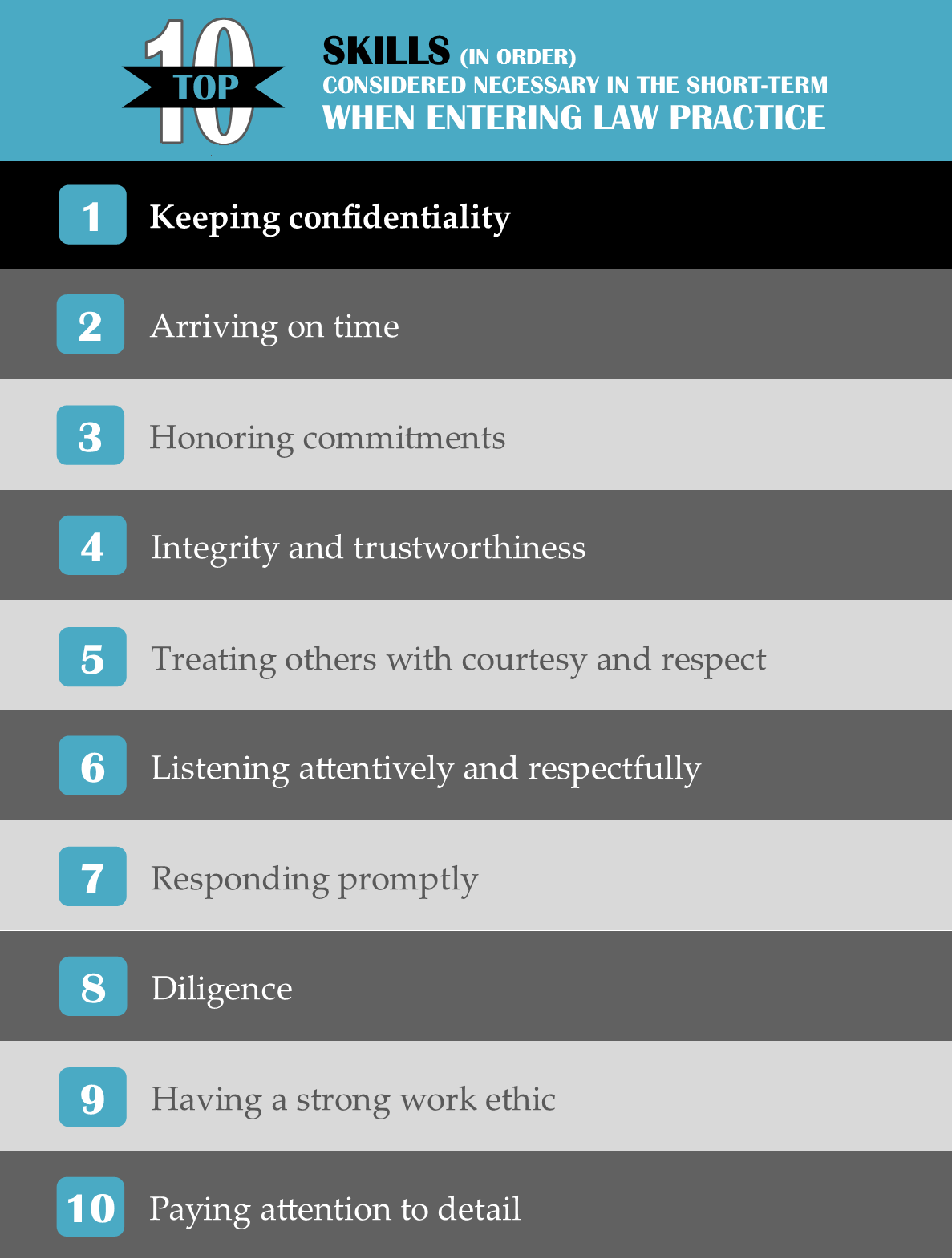Lawyers: not so
different from their clients
Study identifies the top 10 skills necessary for new
lawyers' success
By Zak Bratton
Soft skills, not technical skills, are what define success for new lawyers in the short-term. A new study by the Institute for the Advancement of the American Legal System (IAALS) identified the fact that professional competencies and characteristics dominate over legal skills in more than 37 states when entering law practice.
More than 24,000 lawyers in the nation identified serviced-based, non-legal skills as more important to new and prospective lawyers than legal skills. Keeping client information confidential, arriving on time and honoring commitments were distinguished as key essential skills over effectively researching the law and critically evaluating arguments.
Does that mean a new lawyer should stop practicing their ability to draft pleadings and start keeping everything a secret?
"No," says
Alli Gerkman who is the Director of Educating Tomorrow's Lawyers, a
program launched by IAALS to partner
the legal profession and its employers with law schools to develop student
skills concurrent with the needs of the evolving legal profession. But it doesn't mean a hiring partner
won't be looking at intangibles in addition to a writing sample.
"These things are just so universal. It suggests lawyers aren't as different as we think we are," Gerkman said. "These characteristics and competencies that are so important for lawyers are important for everyone. They are important in your career, but they are the same things that are important in your life."
Developed in 2011, Educating Tomorrow's Lawyers includes
several sub-initiatives, one of which is Foundations for Practice. As the
brainchild for the survey, Foundations for Practice seeks to establish the fundamentals new lawyers
need in order to prepare for practicing law and assisting clients.
The first of its kind, the results of the national survey hope to bring about systemic change to law schools and legal education, as well as to how legal employers recruit and hire.
"It may be a pathway to figuring out how to bring people into the profession who really are going to be better lawyers, which is better for everyone," Gerkman said. "It gives us an opportunity to understand, in terms of breaking down walls, how we are more like our clients than we even think we are. The more that we can be better developed with our characteristics and our communication skills, the better we are going to be able to serve them."
A breakdown of the top skills necessary in the short-term were professional competencies and characteristics. No legal skills were featured in the top-10 skills that were deemed necessary for new lawyers' success. Additionally, out of the 147 individual skills, characteristics, and professional competencies, 76 percent of characteristics were identified by respondents as necessary in the short-term while only about 40 percent of legal skills were identified as such.
According to Gerkman, the results suggest that the staunch emphasis on test scores and academic performance overshadows the real development new lawyers need: experience-based development with the potential to reinforce soft skills.
"(The results) suggest that academic performance, though it may continue to have some importance, really is not determinative of whether someone is going to be a good lawyer or not," Gerkman said. "We need to think about how to ensure that we are filtering based on the things that really matter and not based on a very narrow slice of a person which is their cognitive intelligence or their test-taking abilities."
IAALS and
Educating Tomorrow's Lawyers have embraced the challenge of creating a
conversation among legal education stakeholders, employers and law schools to
better prepare law students and prospective attorneys. But Gerkman said those
same students need to embrace this challenge through introspection and
self-assessments to identify strengths and weaknesses.
Law students aren't in it alone, however. Roughly a year removed from the survey results, Foundations for Practice has started working directly with a handful of schools and employers across the country to turn the statistics into real-world learning outcomes.
Additionally, Gerkman said the development of hiring rubrics will be modified to allow legal employers to make sure the hiring phase focuses on characteristics and professional competencies, not solely academic performance.
Legal educators have also embraced this newfound information and joined the conversation to change the landscape for new lawyers.
"The response from legal educators has been very positive," Gerkman said. "They are interested in ensuring their programs of legal education are getting to the outcomes that are really necessary for moving into the profession."
Originally
released in July 2016, the survey reached out to approximately 780,694
lawyers in 37 states, approximately 37,000 of them from Colorado. In a one-year
span, a total of 24,137 responses from all 37 states were returned.
More information can be found on the IAALS, Foundations for Practice
website: http://iaals.du.edu/foundations
Zak Bratton is the Education and Outreach Coordinator in the Office of Attorney Regulation Counsel.
